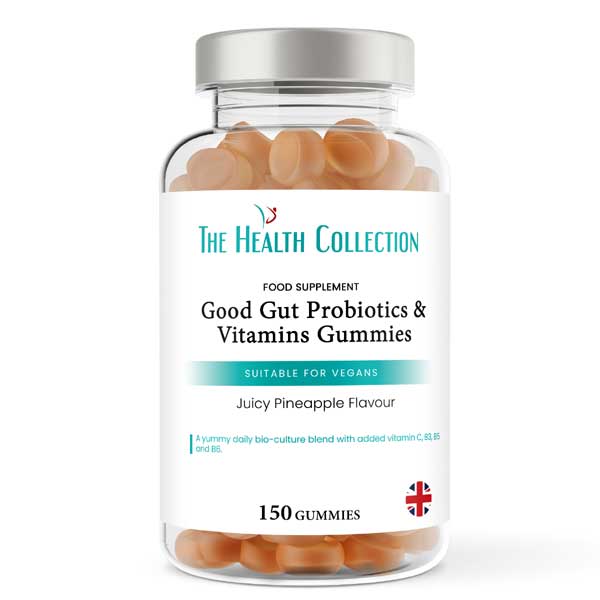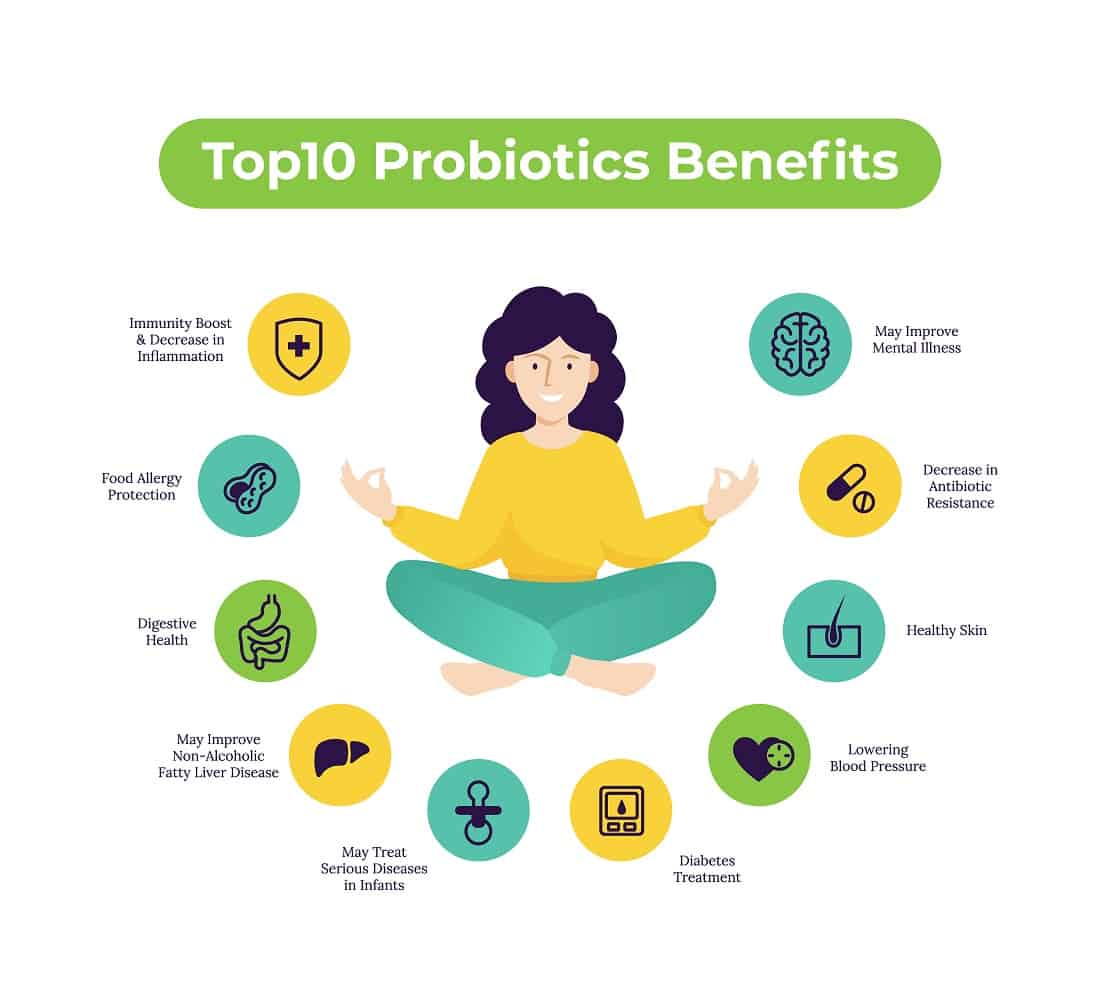The Ultimate Guide to Probiotics: Boost Your Gut Health and Unleash Your True Potential
Welcome to our ultimate guide to probiotics, where we unlock the secrets to optimising your gut health and unlocking your true potential. Probiotics are more than just a fad; they are an essential part of our overall wellbeing. By understanding how probiotics work and incorporating them into our daily routine, we can boost our gut health and experience a myriad of possible benefits.
In this comprehensive guide, we will delve into the world of probiotics, exploring what they are, how they work, and the different types available. We’ll also uncover the science backed benefits of probiotics, from their potential in improving digestion and immune function to supporting mental health and weight management.
Armed with this knowledge, you will be empowered to make informed decisions about integrating probiotics into your life. Whether you’re a curious newcomer or a seasoned probiotic enthusiast, this guide will provide you with all the tools you need to optimise your gut health and enhance your overall wellbeing. So, get ready to unleash your true potential, radiate vitality and embark on a journey towards a healthier, happier you. Let’s dive in!

Understanding The Gut Microbiome
The gut microbiome refers to the trillions of microorganisms, including bacteria, fungi, and viruses, that reside in our gastrointestinal tract. These microorganisms play a crucial role in maintaining our overall health and wellbeing. They help with digestion, nutrient absorption, immune function and even influence our mood and mental health.
A healthy gut microbiome is characterised by a diverse and balanced community of microorganisms. However, various factors such as poor diet, stress, medication use, and environmental toxins can disrupt this delicate balance, leading to an imbalance in gut bacteria known as dysbiosis.
Dysbiosis has been linked to a wide range of health issues, including digestive disorders, weakened immune function, mental health disorders, and even obesity. This is where probiotics come in, as they can contribute to restoring and maintaining a healthy balance of gut bacteria.
Probiotics are live micro organisms that, when consumed in adequate amounts, can confer health benefits to the host. They work by colonising the gut and promoting the growth of beneficial bacteria while inhibiting the growth of harmful bacteria. By improving the diversity and balance of the gut microbiome, probiotics can help support your optimal gut health and overall wellness.
Probiotics Benefits For Gut Health


Probiotics can offer a multitude of benefits for gut health. One of their primary roles is to support digestion and nutrient absorption. They help break down complex carbohydrates, proteins, and fats, making them easier for the body to digest and absorb. This contributes towards alleviating digestive issues such as bloating, gas and constipation.
In addition to digestion, probiotics also play a crucial role in supporting a healthy immune system. A significant portion of our immune system resides in the gut and the gut microbiome plays a vital role in immune function. Probiotics can help regulate the immune response, preventing harmful bacteria from taking hold and causing infections. They can also stimulate the production of antibodies, which are essential for combating pathogens that invade your body.
Furthermore, probiotics have been shown to play an important role in supporting mental health and general wellbeing. The gut and the brain are connected through a complex network known as the gut-brain axis. The gut microbiome produces neurotransmitters and other chemicals that influence brain function and mood. By promoting a healthy gut microbiome, probiotics can help alleviate symptoms of anxiety, depression and other mental health disorders.
Types Of Probiotics
Probiotics come in various strains, each with its unique characteristics and benefits. The most commonly studied and used probiotic strains belong to the Lactobacillus and Bifidobacterium genera. These strains have been extensively researched for their health promoting properties.
Lactobacillus strains, such as Lactobacillus acidophilus and Lactobacillus rhamnosus, are known for their ability to support digestion and immune function. They are commonly found in fermented foods like yogurt and sauerkraut.
Bifidobacterium strains, such as Bifidobacterium bifidum and Bifidobacterium longum, are known for their ability to support gut health and improve bowel regularity. They are commonly found in fermented dairy products and some probiotic supplements.
Other probiotic strains, such as Saccharomyces boulardii and Streptococcus thermophilus, also offer unique benefits. Saccharomyces boulardii, a yeast probiotic, has been shown to help alleviate symptoms of diarrhoea and support the gut barrier function. Streptococcus thermophilus, commonly found in yogurt, contributes to lactose digestion and may help alleviate lactose intolerance symptoms.
When choosing a probiotic supplement, its essential to consider the specific strains and their intended benefits. Look for products that provide detailed information about the strains and their potency. Additionally, choose supplements that are backed by scientific research and have undergone rigorous testing for quality and purity.
Choosing The Right Probiotic Supplement
While probiotic supplements are a convenient option and do work, you can also incorporate probiotics into your diet through probiotic rich foods. Fermented foods are excellent sources of naturally occurring probiotics and offer additional health benefits. And not forgetting prebiotics. Prebiotics are the food source for your gut micro organisms so a healthy gut depends on prebiotics, an the best prebiotic food sources include garlic, dandelion greens, chicory, artichoke, onions, leeks, asparagus, bananas, barley, oats, apples, burdock root, wheat bran, seaweed, cocoa and flaxseed.
Yogurt is perhaps the most well known probiotic rich food. Look for yogurt that contains live and active cultures, as these are the beneficial bacteria that provide the probiotic benefits. Other fermented dairy products like kefir and buttermilk also contain probiotics.
Sauerkraut and other fermented vegetables like kimchi are packed with probiotics and offer a tangy, flavourful addition to meals. These fermented vegetables are made by fermenting cabbage and other vegetables with salt and spices, creating a rich environment for beneficial bacteria to thrive.
Miso, a traditional Japanese seasoning made from fermented soybeans, is another probiotic-rich food. It adds a savoury umami flavour to dishes and can be used in soups, marinades and dressings.
In addition to these, other fermented foods like kombucha, tempeh, and pickles are also excellent sources of probiotics. Experiment with different probiotic rich foods to find the ones that you enjoy and suit your dietary preferences.
Probiotic supplements are an excellent way to fill in the gaps in your good gut bacteria strategy or if you think that you are not eating enough in your diet.


Adding Probiotic Rich Foods To Your Diet
Probiotics have shown promise in alleviating symptoms associated with specific health conditions. Let’s explore how probiotics can benefit some common issues:
- Irritable Bowel Syndrome (IBS): IBS is a chronic digestive disorder characterized by symptoms like abdominal pain, bloating, and changes in bowel habits. Certain probiotic strains, such as Lactobacillus plantarum and Bifidobacterium infantis, have been shown to help alleviate IBS symptoms and improve quality of life.
- Candida: More than just a simple yeast infection, candida can be a signal that all is not well in your gut. An insufficient amount or unhealthy good gut bacteria allow the overgrowth of yeast an can lead to constipation, diarrhoea, bloating, red itchy skin rashes and lesions. Candida Support Formula contains natural nutrients and herbs to restore the yeast balance in your gut.
- Inflammatory Bowel Disease (IBD): IBD includes conditions like Crohn’s disease and ulcerative colitis, which cause chronic inflammation in the digestive tract. Probiotics can help reduce inflammation, support gut healing, and alleviate symptoms associated with IBD.
- Antibiotic-Associated Diarrhea: Antibiotics can disrupt the balance of gut bacteria, leading to diarrhoea. Probiotics, especially Saccharomyces boulardii, can help prevent and alleviate antibiotic-associated diarrhoea by restoring the balance of gut bacteria.
- Urinary Tract Infections (UTIs): Certain probiotic strains, such as Lactobacillus rhamnosus and Lactobacillus reuteri, can help prevent and reduce the recurrence of urinary tract infections by inhibiting the growth of harmful bacteria in the urinary tract.
Remember, its essential to consult with your healthcare provider before starting any new probiotic regimen, especially if you have underlying health conditions or are taking medications.
Probiotics For Health Conditions


In terms of immune system support, probiotics can contribute towards helping regulate immune responses, preventing harmful bacteria from taking hold and causing infections. Probiotics also stimulate the production of antibodies, which are essential for fighting off pathogens and boosting immune function. By incorporating probiotics into your daily routine, you have the potential support both your mental health and immune system, leading to a healthier and more resilient you.
Mental Wellbeing & Your Immune System
Maintaining a healthy weight is a goal for many individuals. Probiotics may offer some support in achieving and maintaining a healthy weight.
Certain probiotic strains, such as Lactobacillus gasseri and Lactobacillus fermentum, have been shown to help reduce body weight and fat mass. These probiotics work by influencing the hormones involved in appetite regulation and fat metabolism.
Probiotics may also help improve insulin sensitivity, which is essential for maintaining stable blood sugar levels. By promoting a healthy balance of gut bacteria, probiotics can support overall metabolic health.
While probiotics alone are not a magic weight loss solution, they can be a useful addition to a healthy lifestyle that includes a balanced diet and regular exercise.


Probiotics & Weight Management
Probiotics are not just a passing trend; they are a powerful tool for optimising your gut health and unleashing your true potential. By understanding the gut microbiome, the benefits of probiotics and the different types available, you can make informed decisions about integrating probiotics into your life.
Whether you choose to incorporate probiotic rich foods or opt for a quality probiotic supplement, the key is consistency. Consistently nourishing your gut with beneficial bacteria can lead to improved digestion, enhanced immune function, better mental health and even support weight management.
So, take charge of your gut health, unlock the power of probiotics, and embark on your journey towards optimal health and wellbeing. The road may have its twists and turns, but with probiotics by your side, you’re well equipped to achieve a healthier, happier you.
Read nature.com’s Scientific Report on Supplementation of Overweight and Obese Adults with Lactobacilli and Bifidobacteria Reduces Bodyweight
Our Conclusion
Probiotics are live bacteria and yeasts that are beneficial for our health, especially our digestive system. Contrary to popular belief, not all bacteria are harmful. In fact, our bodies are teeming with trillions of bacteria, both good and bad, that make up our microbiome.
The microbiome is a complex ecosystem of microorganisms that reside in our gut, skin, mouth, and other parts of our body. It plays a crucial role in maintaining our overall health and well-being. However, factors such as poor diet, stress, antibiotics, and environmental toxins can disrupt the delicate balance of our microbiome, leading to various health issues.
This is where probiotics come in. Probiotics are strains of bacteria that, when consumed in adequate amounts, can restore and maintain the balance of our gut microbiome, promoting our optimal digestion and overall health. They work by colonising the gut, competing with harmful bacteria and producing beneficial metabolites that support overall wellness.
Want to know more about your gut heath? Read our informative article 6 Steps To Heal Your Gut.
Thank you for reading our article and if you have anything to add, we would love if you could add it to the comments below and don’t forget to read our Disclaimer.


If you would like to keep up to date on our future articles and news, please subscribe to our newsletter below.


